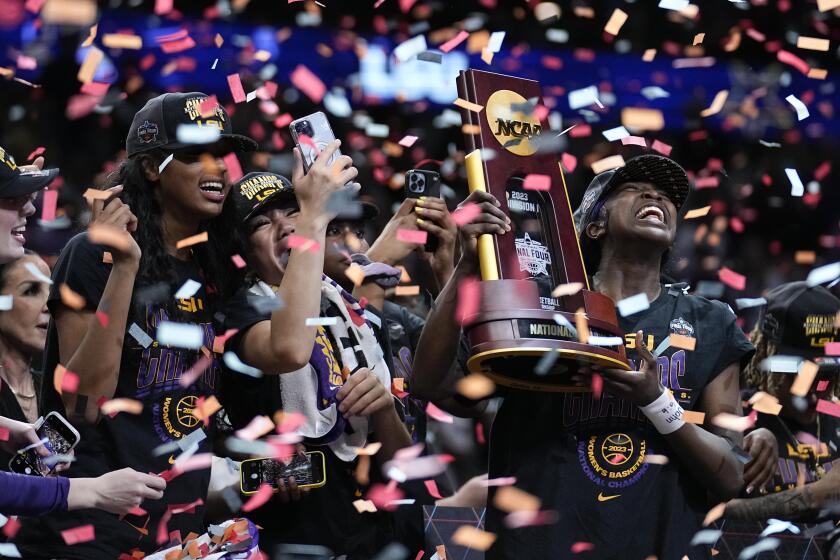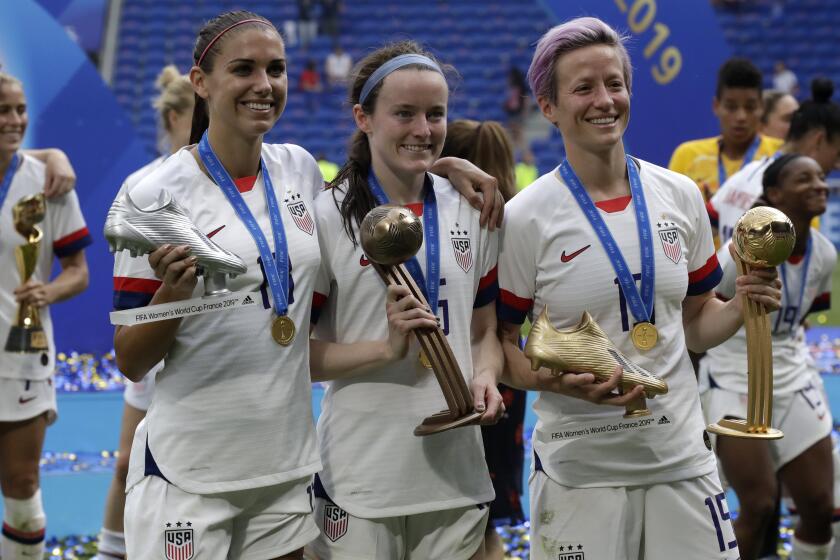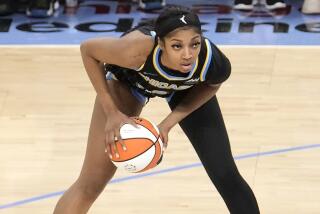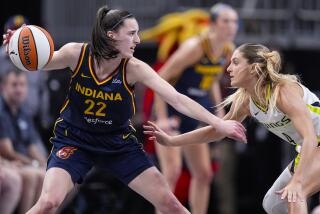Column: Angel Reese isn’t harming women’s sports. Her pearl-clutching critics are
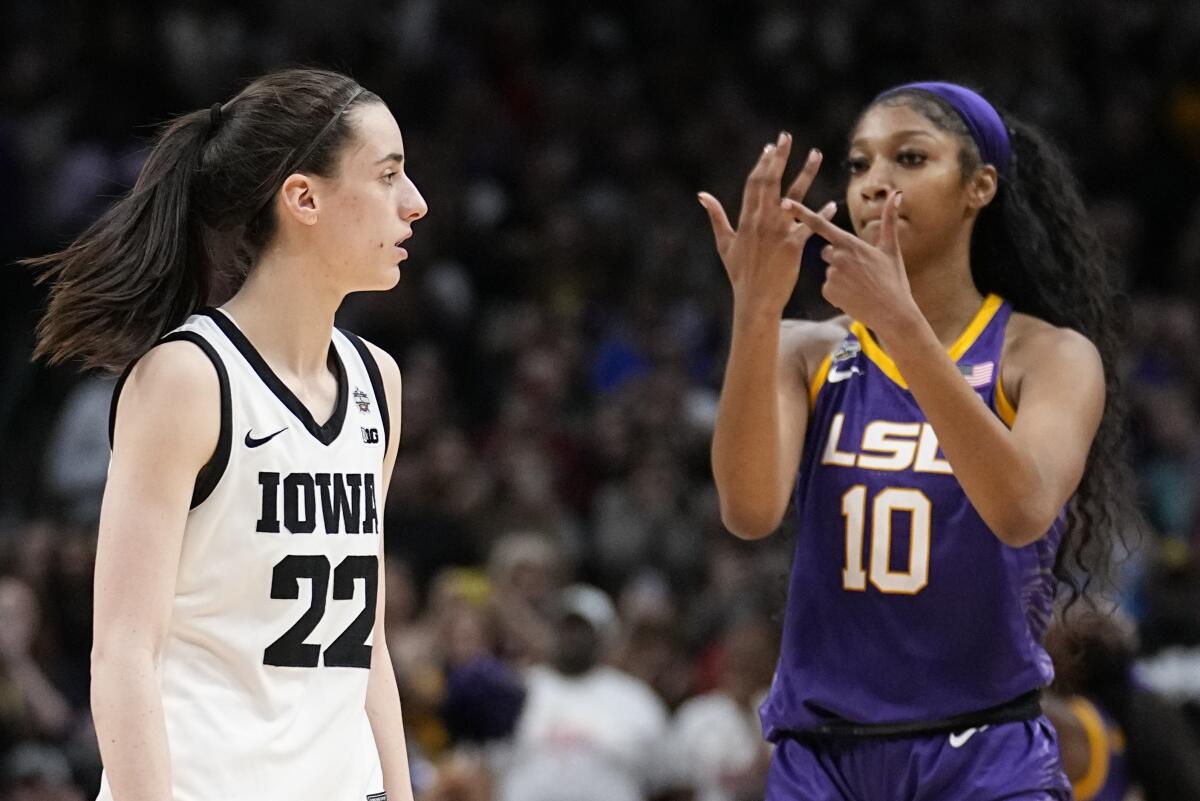
The biggest obstacle women’s sports faces in this country is not a lack of talent, athletic stamina or even public interest.
It’s pearls.
As in men clutching theirs every time a female sports star has the temerity to act like one.
This weekend, women’s college basketball had three of the most exciting and widely viewed Final Four games in its history. Two major upsets — LSU’s defeat of Virginia Tech and Iowa’s win over South Carolina — led to a final in which sophomore Angel Reese and the deep bench of LSU overcame the phenomenal star power of Iowa junior Caitlin Clark and the team she has led to so many victories.
Full of ferociously competitive and gorgeously orchestrated play, these edge-of-your-seat games put the lie to the notion that women’s sports are just not as exciting as men’s.
But after LSU’s hard-fought victory, all some people wanted to talk about was what they considered unladylike conduct.
In the final minutes of the game, Reese trash-gestured Clark, passing her hand in front of her face in a “you don’t see me” move (created and made famous by WWE star turned actor John Cena) before pointing to her ring finger, indicating where the championship ring would land.
Clark, who scored 30 points in the game, and a staggering 41 to defeat South Carolina, remained stone-faced — she actually plays basketball and knows that trash, talking or gesturing, is part of the game. She has done it herself.
Many men, however, including David Axelrod, Keith Olbermann, Danny Kanell and Barstool founder David Portnoy, took it upon themselves to publicly admonish Reese, calling her “classless” and worse.
Social and legacy media exploded, with many pointing out that Clark had used the same “you don’t see me” gesture in an earlier game and that the only difference between the two instances was that Clark is white and Reese is Black.
Which is impossible to argue since, when Clark did it, she was praised by many — including Cena.
LSU’s offense overwhelms Caitlin Clark and Iowa in an NCAA championship win that makes Kim Mulkey the first coach to win national titles with different teams.
Reese addressed the issue herself in the after-game presser, pointing out that “when other people do it,” the media says nothing, that she was simply answering the “disrespect” she felt had been aimed at a member of her conference, and that she has always faced criticism that she was “too hood ... too ghetto” to fit into women’s college basketball.
Which she and her team had just completely owned.
It was not the first time in the Final Four that a Black woman felt obligated to defend the sort of thing that in a men’s game would simply be considered, you know, playing.
Reese was echoing what South Carolina coach Dawn Staley had said two days before, when asked about her team, which is mostly Black, attracting a reputation for bullying. “We’re not bar fighters. We’re not thugs. We’re not monkeys. We’re not street fighters,” Staley said, referring to the racist language that has been used to describe them. “This team exemplifies how you need to approach basketball, on the court and off the court.”
When called out on the racism of their “classless” comments, Olbermann apologized, but many of Reese’s critics simply doubled down, saying that Clark had been classless too.
Trash-talking in sports is not, of course, limited to the players — heated hyperbole is also the lingua franca of columnists and commentators, and certain female athletes, including Reese and especially Clark, have benefited from over-the-top descriptions of their abilities.
But women are, absolutely and undeniably, held to a different standard of behavior than their male counterparts. Remember when sports writers lost their minds after Brandi Chastain ripped her jersey off after scoring the game-winning penalty kick against China in the Women’s World Cup final? Something victorious male soccer players did regularly?
Or Serena Williams being penalized for the kind of heated language that helped make Jimmy Connors and other male tennis players famous?
It isn’t just the fundamental unfairness of such examples that’s infuriating. It’s the systematic squashing of the kind of personal passion and personality in female athletes that their male counterparts are encouraged to showcase.
And of course I am going to mention king of trash-talking, Larry Bird, here, along with his still-famous, openly rancorous on- (and occasionally off-) court feuds with competitors, including and especially Magic Johnson, with whom he also shared a years-long friendship.
People may not have liked Bird (especially if you lived in L.A.) or his style of play, but no one told him to put his hands down and be nice.
Heated exchanges, “I am the greatest” boasting, midgame antics and personal rivalries have been just as important to the success of both certain male players and men’s sports in general as any display of prowess.
For good reason.
Looking at how the changes women are continuing to spearhead in sports on the 50th anniversary of the passing of Title IX.
Displays of anger, ambition, frustration and pride, player-to-player beefs, unlikely friendships and long-running rivalries humanize the game. Outbursts and competitive exchanges remind the audience that athletes are often feeling the same emotions that their fans are.
Jumping all over Reese for a little well-earned if unnecessary boasting, or coming to Clark’s defense like she’s some 12-year-old who just wandered into a national finals game, diminishes what these women really are: top college athletes in the midst of redefining the game.
It‘s also an exhibit of the very sexism that has kept women’s sports second to men’s. Those who argue against wage parity or women’s sports stadiums inevitably claim that women athletes should receive less because they do not generate the kind of ratings and profit that the men do. Poor marketing and penny-pinching investment are rarely cited as factors, either. It’s just that the games aren’t as intense and entertaining.
Well, the first way to ensure women’s games aren’t as intense and entertaining is to publicly shame any woman who reveals the same kind of emotions or engages in the same kind of behavior that make men’s games so intense and entertaining.
The insistence that women act “nice” or be “classy” has kept women on the fringes of virtually every sphere of power in this country, from presidential politics (“you’re likable enough, Hillary”) to prestige television (imagine if Tony Soprano had been a woman — you can’t, because no female character could have gotten away with it).
Study after study shows that characteristics perceived as hallmarks of ambition, confidence and focus in men are seen as manipulative, arrogant and cold in women.
Add racism to the mix, and it isn’t just the national championship that Angel Reese helped win.
I can think of nothing better for women’s basketball than a heated public rivalry between Reese and Clark, complete with repeated on-court exchanges and stories of legendary trash-talking that carries over into the pros.
Maybe such a thing would, like Bird and Johnson’s, blossom into an off-court friendship. Maybe it wouldn’t.
But as Sunday’s game proved, it would make for really great basketball.
More to Read
The biggest entertainment stories
Get our big stories about Hollywood, film, television, music, arts, culture and more right in your inbox as soon as they publish.
You may occasionally receive promotional content from the Los Angeles Times.
